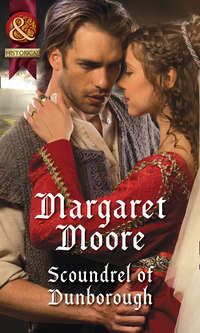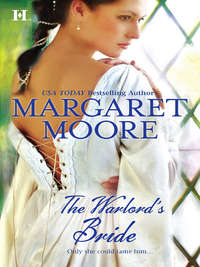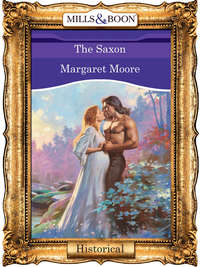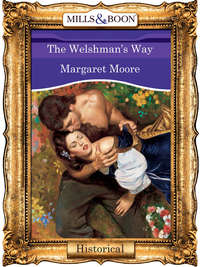
Полная версия
The Notorious Knight

Praise for Margaret Moore
‘Set during the reign of King John,
[it] is filled with fast-paced dialogue and historical details
that add depth and authenticity to the story.
Readers will be well entertained…’
—RT Book Reviews on MY LORD’S DESIRE
‘Ms Moore transports her readers
to a fascinating time period, vividly bringing to life a
Scottish medieval castle and the inhabitants within.’
—Romance Reviews Today on LORD OF DUNKEATHE
‘This captivating adventure of thirteenth-century Scotland
kept me enthralled from beginning to end. It’s a keeper!’
—Romance Junkies on BRIDE OF LOCHBARR
‘Ms Moore…will make your mind
dream of knights in shining armour.’
—Rendezvous
‘When it comes to excellence in historical romance books,
no one provides the audience with
more than the award-winning Ms Moore.’
—Under the Covers
‘Margaret Moore is a master storyteller who has the
uncanny ability to develop new twists on old themes.’
—Affaire de Coeur
‘[Margaret Moore’s] writing captivates, spellbinds, taking
a reader away on a whirlwind of emotion and intrigue
until you just can’t wait to see how it all turns out.’
—Romance Reader at Heart
‘If you’re looking for a fix for your
medieval historical romance need, then grab hold of a
copy of award-winning author Margaret Moore’s
THE UNWILLING BRIDE and do not let go!’
—A Romance Review
Gillian laid her hand lightly on Bayard’s arm, to offer what silent comfort she could.
Yet as she did she became achingly aware of the feel of his flesh and muscle beneath her fingertips. Of his proximity and the masculine scent of leather and wool attending him. Of his lips so close to hers.
He was her sister Adelaide’s brother-in-law, sent to protect her. Not to woo her. Never to court or to kiss. Never to wed or to love. He drew her to him. She should stop him…protest…refuse…run…
She couldn’t. Didn’t want to. The moment their lips met the walls she’d erected around her heart broke into a thousand pieces, destroyed by his touch.
Desire, so long held in check, burst free from its restraints, and the longing she had tried to deny leaped into life.
She wanted to be in his arms, to feel and experience passion once again, and to be desired in return.
So she kissed him fervently, and with an almost desperate longing—as if she were a wanton with no more thought for the future than warming a man’s bed.
This man’s bed.
The Notorious Knight
Margaret Moore

www.millsandboon.co.uk
Award-winning author MARGARET MOORE began her career at the age of eight, when she and a friend concocted stories featuring a lovely damsel and a handsome, misunderstood thief nicknamed ‘The Red Sheik’. Unknowingly pursuing her destiny, Margaret graduated with distinction from the University of Toronto, Canada. She has been a Leading Wren in the Royal Canadian Naval Reserve, an award-winning public speaker, a member of an archery team, and a student of fencing and ballroom dancing. She has also worked for every major department store chain in Canada.
Margaret lives in Toronto, Ontario, with her husband of over twenty-five years. Her two children have grown up understanding that it’s part of their mother’s job to discuss non-existent people and their problems. When not writing, Margaret updates her blog and website at www.margaretmoore.com
Novels by Margaret Moore:
THE OVERLORD’S BRIDE
COMFORT AND JOY (in The Christmas Visit) BRIDE OF LOCHBARR LORD OF DUNKEATHE THE VAGABOND KNIGHT (in Yuletide Weddings) THE UNWILLING BRIDE THE DUKE’S DESIRE HERS TO COMMAND HERS TO DESIRE THE DUKE’S DILEMMA MY LORD’S DESIRE
And as a Mills & Boon® Historical Undone eBook:
THE WELSH LORD’S MISTRESS
In memory ofPatricia Probert and Holly Stemmler
Chapter One
England, 1204
THE IRON RINGS of chain mail jingled as Sir Bayard de Boisbaston raised his right arm to halt his men.
“Well, Frederic, what do you make of Castle Averette?” he asked his young squire, pointing across the wooded valley.
Frederic de Sere squinted at the gray stone fortress on the low rise opposite and shifted nervously in his saddle. “Small, isn’t it?”
“From what we can see, you’d think so,” Bayard agreed, “but not every castle is built in a circle. It could be that the barbican and towers facing the main road are at the narrow end.”
He gestured at the towers at either side of the gate. “Archers have a clear view of the portcullis and good angles to shoot anybody approaching or getting close to the gate.”
He’d also noticed that the trees and bushes had been cut back from the sides of the road, leaving a swath of bracken-covered ground between the road and the wood that was at least ten feet wide on either side. No enemies or footpads could ambush travelers before they had time to draw their swords and defend themselves.
Frederic brushed a lock of light brown hair from his eyes. “Yes, I see, my lord.”
“On to Averette,” Bayard said as he nudged his horse into a walk.
Whatever else the late lord of Averette had been—and apparently he’d been a terrible man—he’d also been a man of some intelligence, at least when it came to defense, Bayard reflected as he and his men rode in silence along the river toward what looked to be a prosperous village. They passed a millpond and the mill, its wheel turning with a slow, steady motion. Cattle lowed from a nearby field, a few sheep scattered as they went past a meadow, and they could hear geese honking and chickens clucking in farmyards along the road.
The village itself was not large, but the buildings were in good repair and the people appeared well fed. A few ragged children, with mongrel dogs yapping at their heels, ran out of an alley between a chandler’s stall and an inn sporting a sign depicting a stag’s head to stare at them, openmouthed. At the inn’s door stood an ample-bosomed wench who eyed Bayard and his men with avaricious calculation. If she thought she’d get any custom from him, however, she was sorely mistaken.
Around the green, merchants at their stalls, as well as their customers, stopped to watch them go by. So did the group of elderly men seated beneath the large oak by the smithy that belched smoke even on this summer day, and the girls and women standing by the well.
No doubt there would be the usual comments after he was gone, Bayard thought, about his body, and his bearing, and the scar that ran from his right eye to his chin. They’d wonder where he got it, and how, and who had done it. Some would say it marred his face; a few would declare they liked it.
He’d heard it all before. Too many times.
Soon enough somebody would remember they’d heard of the notorious Sir Bayard de Boisbaston and recall the nickname he’d earned when he’d first arrived at court. He’d been sixteen, as well as spoiled, vain, and determined to make a name for himself.
He’d certainly done the latter.
Bayard slid a glance at fifteen-year-old Frederic, who was now sitting his horse with more lordly dignity and looking straight ahead as if completely unaware of the feminine attention directed their way.
Undoubtedly he was really enjoying every moment of that attention. The pride and folly of youth! One day he, too, would likely learn that not all attention was good, and not every woman who admired him was worthy of pursuit, or that winning his way into her bed such a great triumph.
A shout of warning came from the castle.
The sentries were alert, then. Given the news he had to deliver, Bayard decided it would be better to get the initial meeting over. He ordered his men to quicken their pace and lightly kicked his own horse into a canter.
As they neared the castle gates, a boy suddenly darted out from behind a farmer’s cart filled with empty baskets, running toward the rickety gate in the fence opposite like a pheasant flushed from the underbrush.
Cursing, Bayard reined in his mount so hard, Danceur went back on his haunches and whinnied in protest. At nearly the same time, a woman appeared as if out of thin air in the cottage yard. She wrenched open the gate with such force she tore the top leather hinge clear off, scooped the child into her arms, and fled back to the well-kept yard. Clutching the child to her, she glared at Bayard as though he’d deliberately tried to murder the boy.
His heart pounding as if he’d been attacked, Bayard glared right back. He hadn’t harmed the child, and it wouldn’t have been his fault if he had. The boy had run directly into his path.
He was about to remind this ungrateful peasant of that fact when he recalled his mission here. He was to offer help, not enmity, so he stifled his temper. Thinking a few coins would soothe any ill will caused by this near accident, he dismounted and walked through the broken gate toward the mother and her child.
The boy, who couldn’t be more than six years old, stared at him with wide-eyed awe. His mother continued to glower.
She wore a simple peasant’s gown of light-brown wool and her honey-brown hair was covered by a linen veil. She was no great beauty, however, and although she might be spirited—and Bayard usually liked women with spirit, at least in his bed—he didn’t appreciate such vitality when it was directed against him.
A heavyset man clad in the rough homespun of a peasant appeared from behind the cottage. His stunned gaze went from Bayard to Frederic and the mounted soldiers on the road, then back to his wife, as if he’d never seen a nobleman with an escort before.
Or perhaps he was wondering why there was a knight standing in his yard.
The woman passed the little boy to her husband, crossed her arms—incidentally revealing that she had very fine breasts—and addressed Bayard without a particle of deference or respect. “What is your business here, sir knight?”
“Who are you to speak to a nobleman in that insolent fashion?” Frederic demanded.
“Easy, lad,” Bayard warned, glancing over his shoulder at the disdainful youth.
Those had been no peasant’s dulcet tones or accent; the woman had betrayed herself with the first word that passed those full and frowning lips.
Bayard removed his helmet, tucked it under his arm and bowed. “Greetings, my lady. I am Sir Bayard de Boisbaston and I bring you news from your sister.”
Not unexpectedly, there was a flash of surprise in the woman’s bright green eyes, but it was quickly gone. Nor did she try to deny who she was.
“What news might this be? And from which one of my sisters?” Lady Gillian d’Averette inquired as coolly as if she met knights in a farmer’s yard every day while attired in peasant’s garb.
Maybe she did, and maybe that was her usual mode of dress; Armand had warned him his bride’s sister was rather unusual, although he hadn’t gone into detail.
Maybe she discussed important news out in the open where anyone might hear, too, but he did not. “I don’t think this is an appropriate place for you to read the letter I bring you, my lady.”
She pursed her lips, and for a moment he thought she might actually refuse.
Fortunately, she didn’t.
“Very well,” she said as she marched past him with unladylike strides. “Come with me, if you will be so kind,” she added over her shoulder.
Armand might also have mentioned that not only did his sister-in-law dress like a peasant, she issued orders like an empress, stomped like an irate merchant, and was nowhere near as beautiful as her sister, Adelaide. She hadn’t given him a kiss of greeting, either.
God’s blood, he’d had a friendlier welcome from the man who’d held him prisoner in France, Bayard thought as he followed her.
In spite of her discourtesy, however, he would say nothing and try to ignore her rudeness.
After all, he hadn’t expected to be welcomed with open arms, so it shouldn’t matter that she was less than thrilled by his arrival. Armand had asked him to bring a message to her, as well as stay to protect his wife’s sister, and that he fully intended to do.
WHAT NEWS COULD this arrogant fellow be bringing from Adelaide and the king’s court? Gillian wondered as she hurried toward the castle and the privacy of the solar.
She doubted it was good.
She and her sisters, Adelaide and Elizabeth—Lizette to those who knew her—were wards of the king. That meant John had complete power over them. He could marry them off as suited his purposes, without any regard at all for their happiness. He also gave guardianships of young male heirs to men who would strip the estates bare before the boys came of age. Indeed, he gave no thought at all to the welfare and safety of those for whom he was responsible, including the people of England.
Who could say what he might have done that could affect her, or the people of Averette?
And why had this knight been chosen to deliver her sister’s message? If Adelaide were ill, a servant would have been dispatched.
Was it possible John had selected a husband for Adelaide, or Lizette, or even her—and this man was to be the groom?
Surely not. Please, God, she hoped not. Not for her, and not a man like this, an arrogant fellow who regarded her, and everyone else, with aggravating condescension.
Over the years she’d met many a man just like him. No doubt this Sir Bayard expected her to be impressed with his rank, his bearing, and his good looks. To be sure, he was handsome, despite the thin scar that went from the corner of his right eye to his chin, but she was no flighty, foolish girl to be so easily impressed.
Only once had she met a knight who had been generous, kind, and humble, and who had, surprisingly, been more interested in her than either of her sisters.
But that had been years ago, and James d’Ardenay was dead.
She glanced at Sir Bayard again. What was he seeing as he approached Averette? Tithes and income? Peasants who should be ready to fight in battles and die for their overlord’s cause?
She saw her home and people who labored to keep it prosperous and safe, secure in times of trouble. She saw men and women with names, faces, families, hopes, and dreams—like Young Davy, who knew more about the history of this village and its folk than anyone else. Old Davy was like a grandfather to her, as his wife had been more of a mother to her than her own poor sickly mother had ever been.
She knew the miller and the baker with their constant conflict, Sam at the tavern and Peg, as well as the morose chandler, who barely said three words to anybody.
She saw people like Hale, the hayward, and father of little Teddy, whom Sir Bayard had nearly run down—not that he seemed troubled by that near accident, and of course he’d assumed a sum of money would be appropriate compensation.
There were many others, each one unique, some more likable than others, but all hers to protect, like this household, castle, and estate.
And she would. To the last breath in her body and regardless of who sat on the throne, she would.
AS THEY NEARED the barbican, ten soldiers of the garrison trotted out and blocked the entrance, their spears tipped forward like a spiked wall. The portcullis had been lowered and the inner gate closed. Several archers also lined the walls, which was no more than Bayard would expect.
“Your men are well trained,” he noted in an attempt to achieve some sort of truce when he and the lady came to a halt.
She couldn’t look prouder if she trained them herself. “They are,” she replied. Then she announced, in a loud, clear voice, “All is well!”
He caught the expression that flashed across the soldiers’ faces. That meant something, and it wasn’t that all was truly well.
Likely it meant she saw no immediate danger but they should be prepared to fight.
The portcullis began to rise, and the soldiers wheeled back so that they lined the road. Bayard dutifully fell into step beside Lady Gillian as they passed through the large gatehouse and across the outer bailey, which contained a practice yard, a garden, a smithy, and a round stone dovecote. He’d been right to suggest to Frederic that the portion of the wall visible from the approaching road was no indication of the actual size of the fortress. This one had been built in a tear shape, with the barbican and gatehouse at the narrow end.
They entered the courtyard through thick, bossed oaken gates. He guessed this fortress was built within the last fifty years, although the round keep behind the long hall was clearly older. Judging by the black marks beneath some of the narrow loopholes in the keep, it had been fired more than once. That it was still standing was a silent testament to its builders’ skill, as well as the quality of their mortar.
The main buildings within the inner wall included the hall, the chapel, storerooms, stables, and the kitchen that was attached to the hall by a corridor. The two-story building to the west of the hall was likely the family apartments and perhaps chambers for their guests. Otherwise, he supposed, he and Frederic would be bedding down in the hall with the soldiers and male servants.
There were no piles of barrels, casks, or baskets outside the buildings; no damaged wagons or other items left where they’d broken down until they could be attended to. Indeed, the courtyard was almost painfully neat, and he could only catch the slightest whiff of dung from the stables, which told him they must be cleaned often.
While the tidiness within the fortress might be impressive, he found the silence and the lack of servants—or at least the last of seeing the servants—unsettling. There wasn’t a single person peering out a window or door, although their arrival had hardly been quiet. Either they were the least curious servants he’d ever encountered or this lady governed her castle with an iron hand.
Half the archers on the inner wall now faced inward, their notched arrows pointing at the cobbled space below. More soldiers stood lining the open area, and in the center stood a tall, barrel-chested man dressed in armor, save for his bare head. His expression was grim, his face clean-shaven, the black hair on his head shot through gray, and he faced the gate as if prepared to hold off an attack all by himself.
The garrison commander, Bayard assumed.
“My lady,” the man said with a Scots accent while running a measuring gaze over Bayard.
A Scot. That was interesting. Bayard had developed a great deal of respect for the Scots during the fighting in France when John had tried to regain his lost possessions.
“Sir Bayard de Boisbaston, this is Iain Mac Ken-dren, the garrison commander responsible for my well-trained troops,” Lady Gillian said with the merest hint of a smile.
She must like the Scot, which was also interesting. Many a lady treated the men who protected her as little more than hounds or hawks. “I’m honored.”
The Scot’s response was a dismissive snort—another reaction Bayard de Boisbaston was not accustomed to receiving.
“He brings news from Lady Adelaide,” Lady Gillian announced, while Bayard struggled to control his annoyance.
Armand might have warned him about the garrison commander, too.
Mac Kendren cocked a bushy gray-and-black brow. “Does he, now?”
“I do,” Bayard said, letting his tone convey some of his displeasure at being spoken to so insolently. “Your garrison commander is to be commended for continuing to hold such responsibility in spite of his poor eyesight, my lady.”
“There’s naught wrong with my eyes,” the Scot declared with a slightly puzzled frown.
Bayard cocked a brow. “I thought there must be when I saw rust on the bottom of your hauberk.”
The Scot glanced down, as did the lady. Bayard permitted himself a little smile of satisfaction when the Scot’s face turned scarlet, for there was indeed three spots of rust at the bottom of his hauberk.
More amusement and challenge came of Bayard’s dark eyes. “I also note, my lady, that we haven’t yet exchanged the kiss of greeting.”
Chapter Two
BAYARD WASN’T SURE WHAT to expect when he gently chastised Lady Gillian, but he wasn’t completely surprised when her green eyes flashed with equal challenge and she boldly walked up to him, raised herself on her toes, and bussed him heartily on both cheeks.
There was more than a slight flush coloring her own round cheeks when she stepped back.
“Such enthusiasm,” he remarked. “I may yet find myself delighted I was sent to Averette.”
As her blush deepened and his gaze held hers, the door to the hall opened, and a man appeared. He was of an age with Bayard and wore a long tunic that brushed the ground. He could have been a priest, except he had no tonsure, and the look he gave the lady was not of priestly piety.
That was interesting, too. Between the hearty kiss and the young man’s obvious affection, perhaps his first impression of Lady Gillian had been mistaken.
He’d been assuming she was the sort of noblewoman who would make a good nun.
Not that it mattered. He was here at Armand’s behest, and for a serious purpose, not to amuse himself with defiant young ladies.
“Sir Bayard de Boisbaston, this is Dunstan de Corley, the steward of Averette,” she said, introducing the young man. “Dunstan, Sir Bayard brings news from Adelaide. Please come with us to the solar.”
She started toward the hall, then paused on the steps before turning back to the yard. “Iain,” she called out. “I’d like you to come to the solar, too.”
The Scot joined them, then the lady of Averette led Bayard, her steward, and her garrison commander through a hall that was equally empty of servants, their footfalls muffled by clean, herb-scented rushes on the floor. Hounds lumbered to their feet, as grim and wary as the soldiers in the yard.
One of the dogs started to growl; a brisk word from the lady silenced him.
Finally Bayard saw a servant. A young, red-haired, freckled wench peered out of the door that led to the kitchen. When she realized he’d spotted her, she ducked out of sight. Perhaps she was just shy, but he was beginning to think Lady Gillian’s household was not a very merry place.
At the far end of the hall they went around a screen that hid another door, then up some steps leading to a narrow, covered wooden walkway. It went from the hall to the keep and was about fifteen feet above the ground.
One had only to set fire to the walkway to make the door to the keep unattainable save by ladders, supposing anyone was willing to risk a hail of arrows, or stones, or boiling water. If there was a well and food inside the keep, they could hold out there for weeks.
The lady unlocked the outer door, then waited while the others entered the building.
Once inside, Bayard surveyed the rough, gray stone walls. Stairs went up and around the inner wall to another level above, while others curved downward, probably leading to chambers used for storage and cells for prisoners.
Like the one in which Armand had been held captive for months, while he’d been treated more like a guest than a prisoner by the Duc d’Ormonde.








